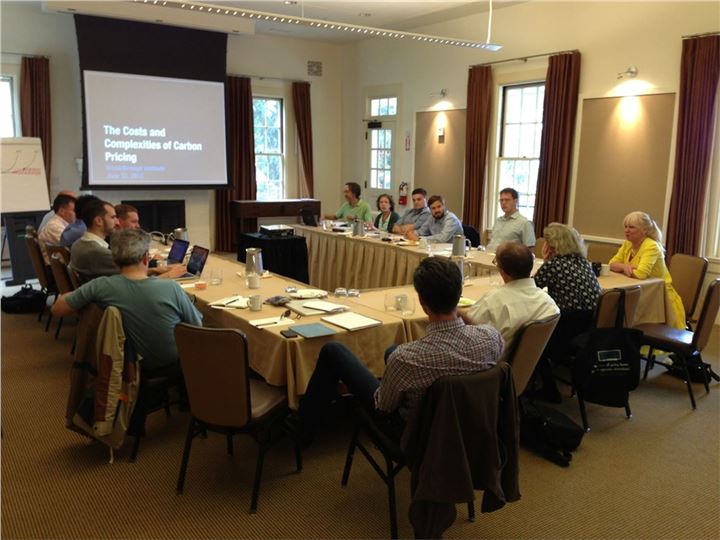Purpose
- Explores and develops market-based solutions.
Summary
Bringing Americans together around a new climate and energy policy framework first requires bringing together policy makers and policy wonks. Too often conversations about climate policy focus narrowly on either the supply or the demand side. Those focused on energy demand propose to make fossil fuels more expensive through new regulations, a carbon tax, and/or a revamped version of cap and trade legislation. Those focused on energy supply call for ways to promote renewables, natural gas, and nuclear energy through increased research and development, subsidies and tax credits, and public-private partnerships aimed at accelerating innovation. In June 2013, the Breakthrough Institute held a meeting to discuss both approaches with leading policy thinkers to clarify the roles of demand- and supply-side policy tools. Breakthrough presented a draft of our carbon pricing paper, and Adele Morris of the Brookings Institution and James Handley of the Carbon Tax Center presented their responses.

Meeting on The Costs and Complexities of Carbon Pricing
Description
On Sunday, June 23, Breakthrough held a roundtable meeting to discuss the economic efficiency, political economy, and technological innovation merits of carbon pricing and the contexts and conditions in which these goals appear to hold.
Attendees at the meeting included:
Michael Shellenberger (Breakthrough Institute)
Ted Nordhaus (Breakthrough Institute)
Adele Morris (Brookings Institution)
James Handley (Carbon Tax Center)
Oliver Morton (the Economist)
Margaret Taylor (Stanford University/Lawrence Berkeley National Lab)
Roger Pielke, Jr. (University of Colorado, Boulder)
Gregory Nemet (University of Wisconsin, Madison)
Tobias Schmidt (ETH Zurich)
Matthew Stepp (Information Technology & Innovation Foundation)
Jacob Fox (Simon Fraser University)
Barrett Walker (Walker Foundation)
Eli Lehrer (R Street)
Loren King (Breakthrough Institute)
Max Luke (Breakthrough Institute)
Alex Trembath (Breakthrough Institute)
Jesse Jenkins (Massachusetts Institute of Technology)
The meeting began with a presentation by Alex Trembath of a paper authored by Breakthrough that reviews the economic, modeling, and innovation literature on carbon pricing. The paper aims to provide scholars and policy makers with greater clarity about carbon pricing and the conditions under which it can advance innovation and emissions reductions. Trembath’s presentation was followed by discussion and responses by Adele Morris of the Brookings Institution and James Handley of the Carbon Tax Center.
The roundtable included extended discussions on the revenue-neutral approach to carbon pricing, the importance of global harmonization, the optimal price for carbon, and carbon pricing’s roll in inducing innovation.
Since the meeting, Breakthrough has engaged extensively with Eli Lehrer, Tobias Schmidt, Jesse Jenkins, Matthew Stepp, and others on the content of Breakthrough’s carbon pricing paper. Feedback from the meeting will be used to shape the paper, which will be published in the fall along with responses from various individuals.
Purpose
This project explores and develops market-based solutions to global warming by seeking clarity on how US climate policy should incorporate, on one hand, policy tools designed to alter energy demand — such as carbon pricing and regulations — and, on the other, supply-side policies such as government support for technology innovation and development. Proponents of carbon pricing believe it will send a market signal that will encourage private sector investment and innovation in clean energy technologies while reducing commitments to fossil fuels. Alternatively, the 35 years of public-private investments in the United States, including a $10 billion tax credit, that have led to today’s shale gas revolution offer important lessons for the future of clean energy innovation. Clarifying the appropriate roles for demand- and supply-side energy policies is important for understanding how the market can be leveraged in support of better climate policy.
Scope
This project is national in scope. It brings together leading national thinkers on energy and climate policy in an effort to advance a new consensus on US climate policy, particularly with regards to the respective roles of energy demand- and supply-side policy tools.
Information Dissemination
Breakthrough’s paper reviewing the literature on carbon pricing — The Costs and Complexities of Carbon Pricing — will incorporate feedback from the carbon pricing roundtable and will be published this fall. Alongside the report, we plan to publish responses by key individuals and institutions involved in the debate. A response to the paper by Charles Komanoff and James Handley has already been drafted and submitted to Breakthrough. Potential respondents include Tobias Schmidt of ETH Zurich, Severin Borenstein of University of California, Berkeley, Rene Kemp of the University of Maastricht, and Ian Parry of the International Monetary Fund.
Amounts Approved$28,620.00
on 4/29/2013
(Check sent: 5/16/2013)
$6,000.00
on 6/10/2013
(Check sent: 7/1/2013)